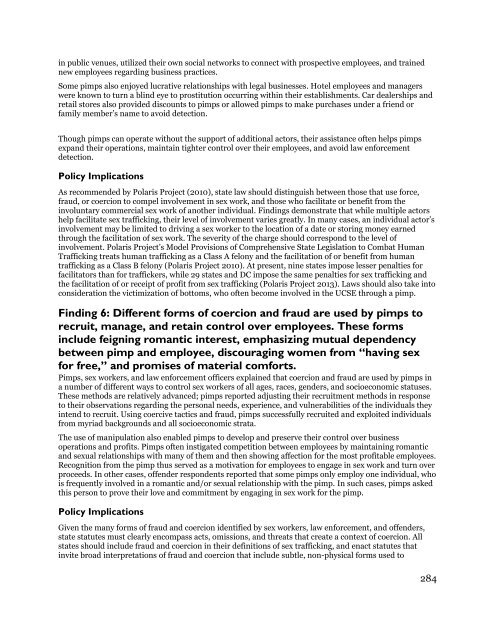413047-Underground-Commercial-Sex-Economy
413047-Underground-Commercial-Sex-Economy
413047-Underground-Commercial-Sex-Economy
You also want an ePaper? Increase the reach of your titles
YUMPU automatically turns print PDFs into web optimized ePapers that Google loves.
in public venues, utilized their own social networks to connect with prospective employees, and trained<br />
new employees regarding business practices.<br />
Some pimps also enjoyed lucrative relationships with legal businesses. Hotel employees and managers<br />
were known to turn a blind eye to prostitution occurring within their establishments. Car dealerships and<br />
retail stores also provided discounts to pimps or allowed pimps to make purchases under a friend or<br />
family member’s name to avoid detection.<br />
Though pimps can operate without the support of additional actors, their assistance often helps pimps<br />
expand their operations, maintain tighter control over their employees, and avoid law enforcement<br />
detection.<br />
Policy Implications<br />
As recommended by Polaris Project (2010), state law should distinguish between those that use force,<br />
fraud, or coercion to compel involvement in sex work, and those who facilitate or benefit from the<br />
involuntary commercial sex work of another individual. Findings demonstrate that while multiple actors<br />
help facilitate sex trafficking, their level of involvement varies greatly. In many cases, an individual actor’s<br />
involvement may be limited to driving a sex worker to the location of a date or storing money earned<br />
through the facilitation of sex work. The severity of the charge should correspond to the level of<br />
involvement. Polaris Project’s Model Provisions of Comprehensive State Legislation to Combat Human<br />
Trafficking treats human trafficking as a Class A felony and the facilitation of or benefit from human<br />
trafficking as a Class B felony (Polaris Project 2010). At present, nine states impose lesser penalties for<br />
facilitators than for traffickers, while 29 states and DC impose the same penalties for sex trafficking and<br />
the facilitation of or receipt of profit from sex trafficking (Polaris Project 2013). Laws should also take into<br />
consideration the victimization of bottoms, who often become involved in the UCSE through a pimp.<br />
Finding 6: Different forms of coercion and fraud are used by pimps to<br />
recruit, manage, and retain control over employees. These forms<br />
include feigning romantic interest, emphasizing mutual dependency<br />
between pimp and employee, discouraging women from “having sex<br />
for free,” and promises of material comforts.<br />
Pimps, sex workers, and law enforcement officers explained that coercion and fraud are used by pimps in<br />
a number of different ways to control sex workers of all ages, races, genders, and socioeconomic statuses.<br />
These methods are relatively advanced; pimps reported adjusting their recruitment methods in response<br />
to their observations regarding the personal needs, experience, and vulnerabilities of the individuals they<br />
intend to recruit. Using coercive tactics and fraud, pimps successfully recruited and exploited individuals<br />
from myriad backgrounds and all socioeconomic strata.<br />
The use of manipulation also enabled pimps to develop and preserve their control over business<br />
operations and profits. Pimps often instigated competition between employees by maintaining romantic<br />
and sexual relationships with many of them and then showing affection for the most profitable employees.<br />
Recognition from the pimp thus served as a motivation for employees to engage in sex work and turn over<br />
proceeds. In other cases, offender respondents reported that some pimps only employ one individual, who<br />
is frequently involved in a romantic and/or sexual relationship with the pimp. In such cases, pimps asked<br />
this person to prove their love and commitment by engaging in sex work for the pimp.<br />
Policy Implications<br />
Given the many forms of fraud and coercion identified by sex workers, law enforcement, and offenders,<br />
state statutes must clearly encompass acts, omissions, and threats that create a context of coercion. All<br />
states should include fraud and coercion in their definitions of sex trafficking, and enact statutes that<br />
invite broad interpretations of fraud and coercion that include subtle, non-physical forms used to<br />
284


